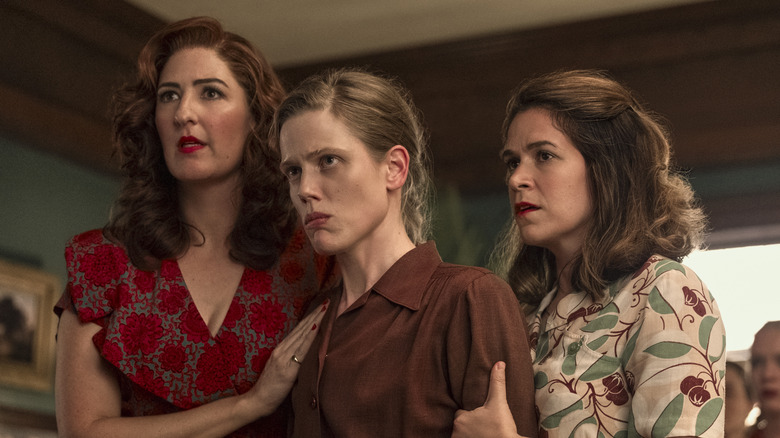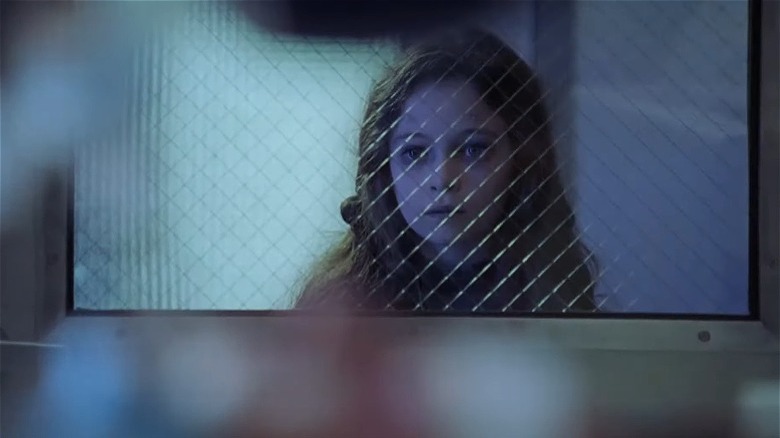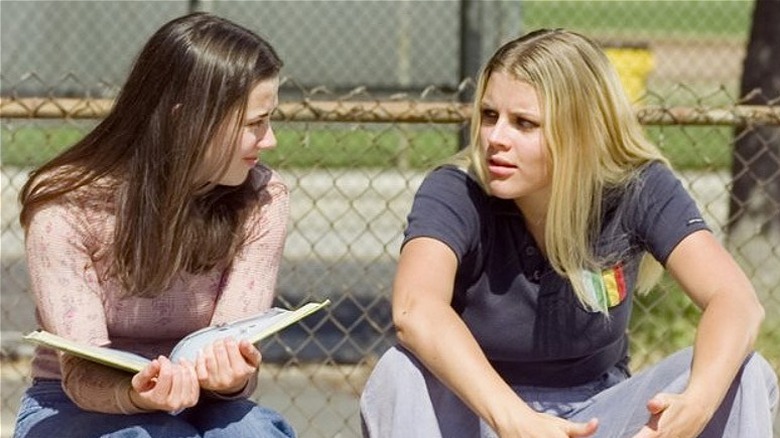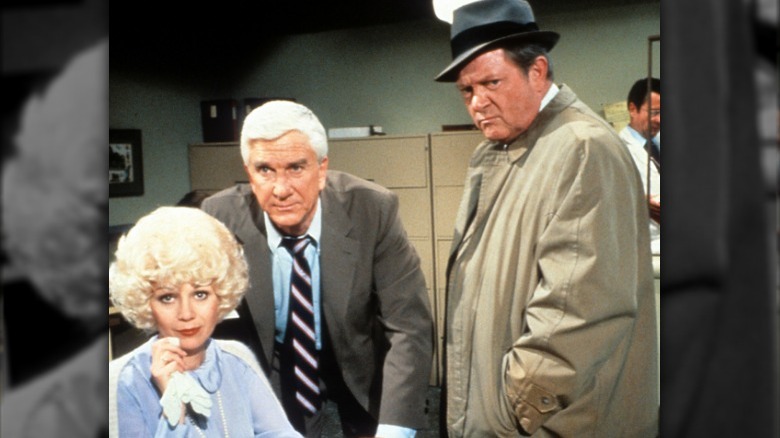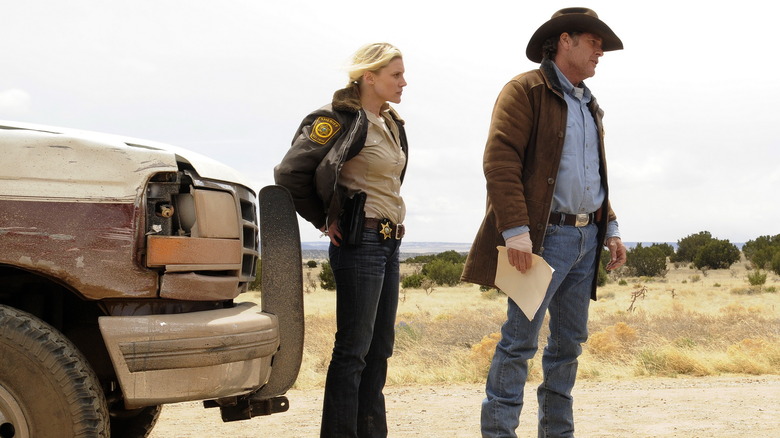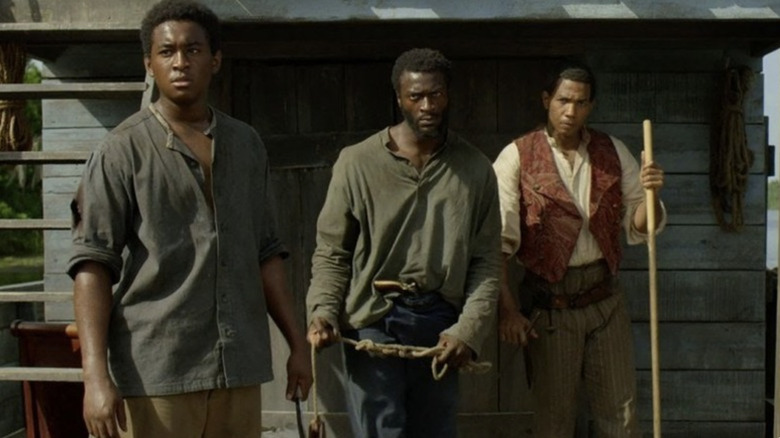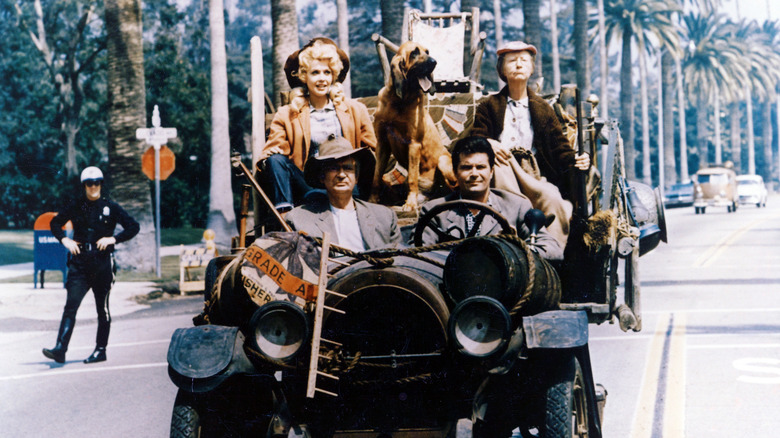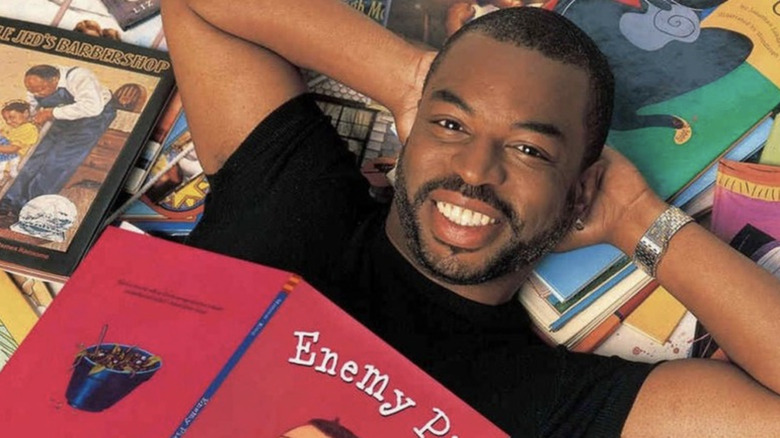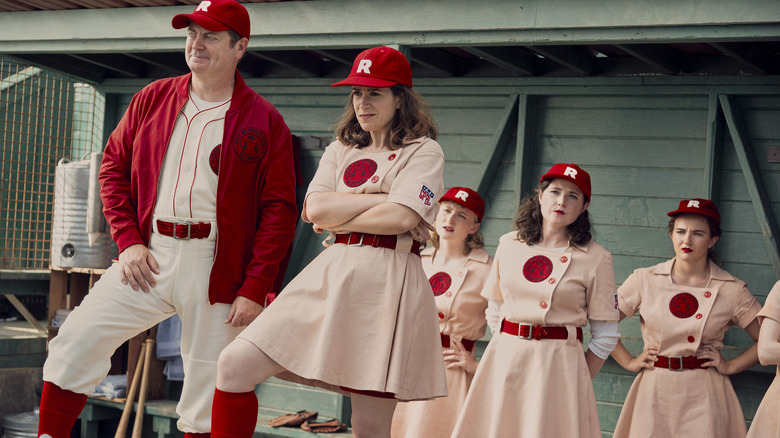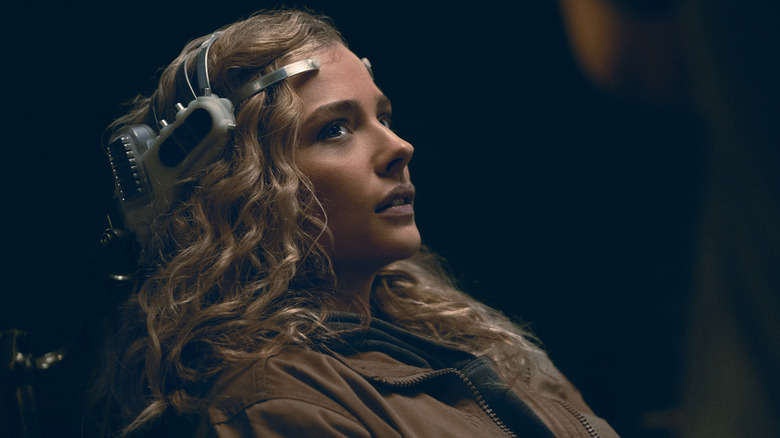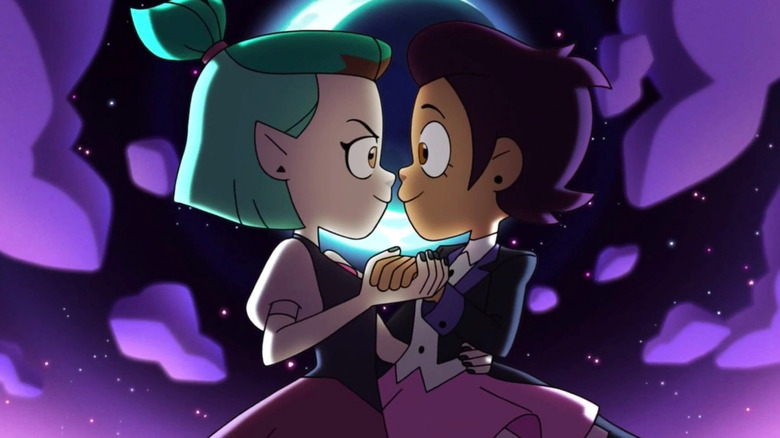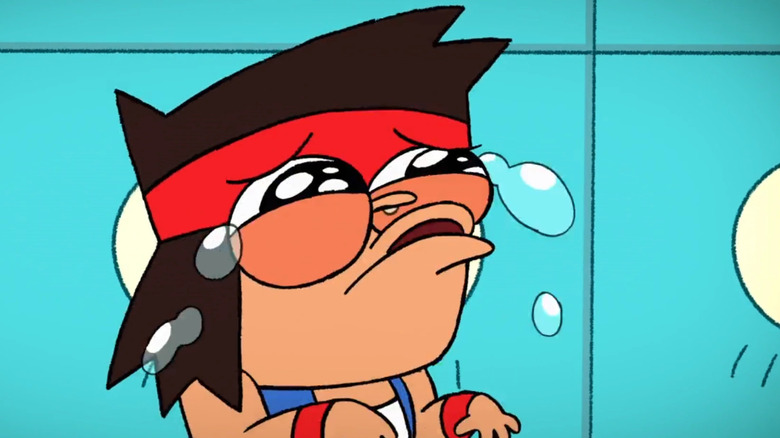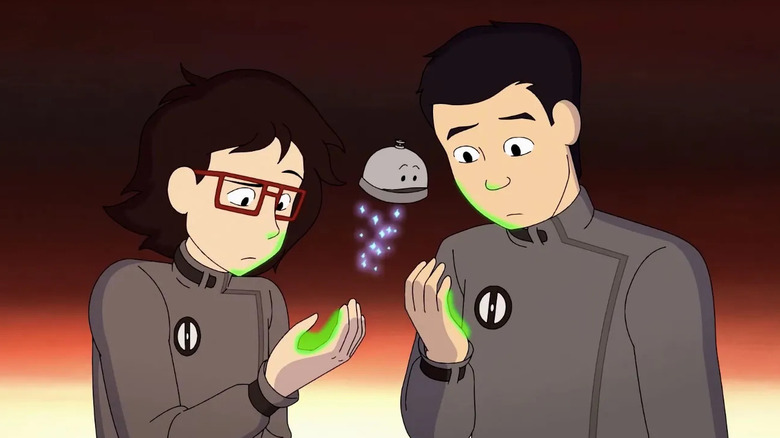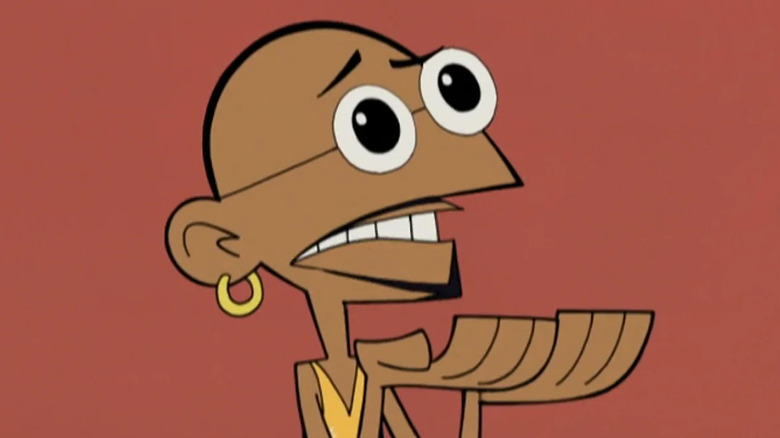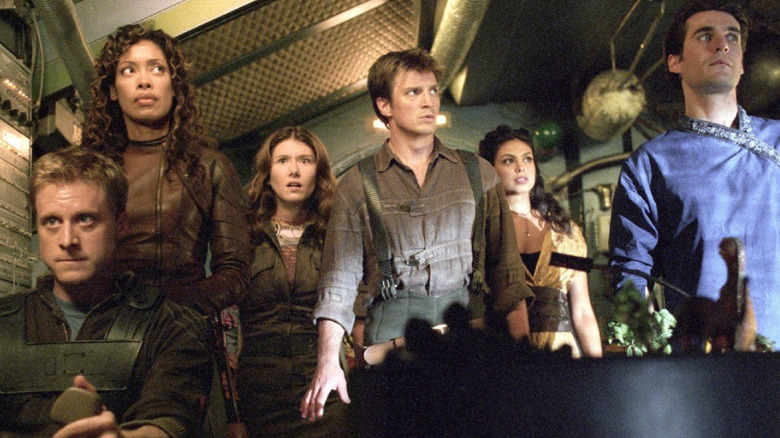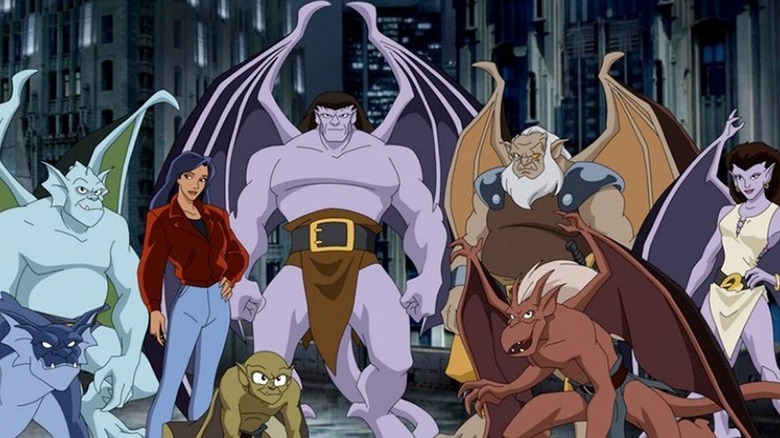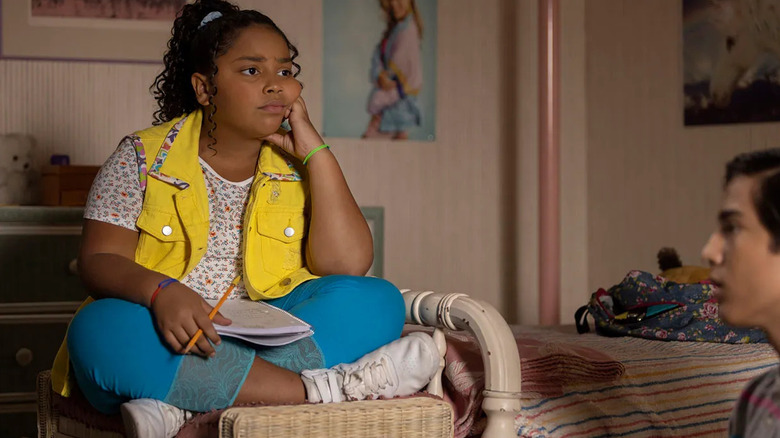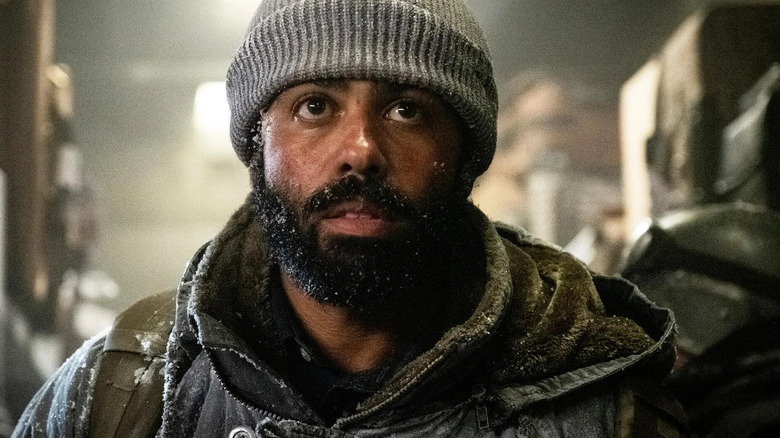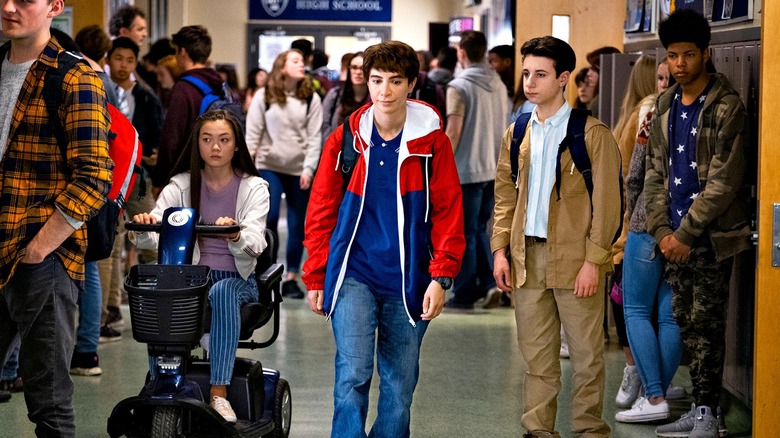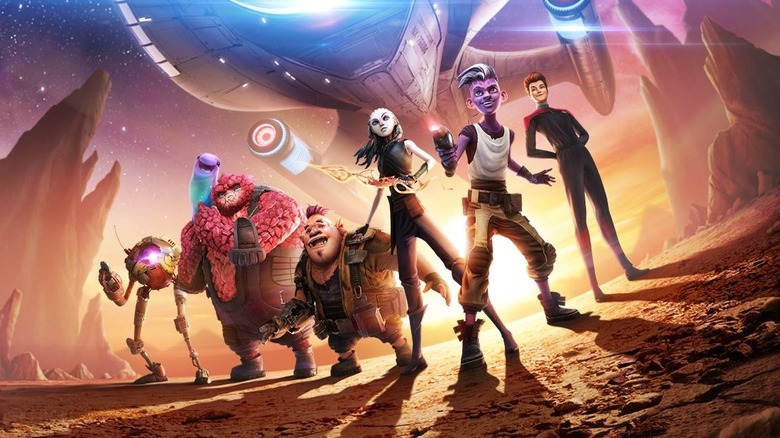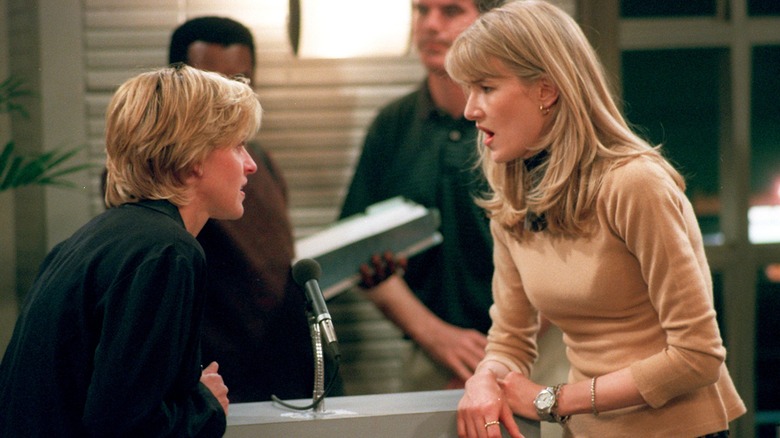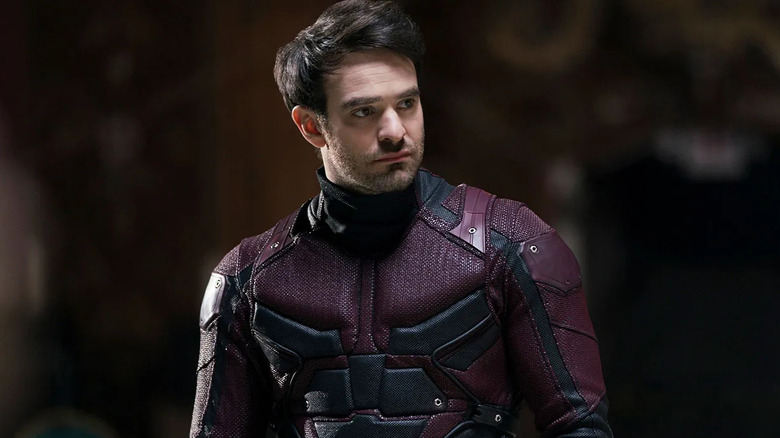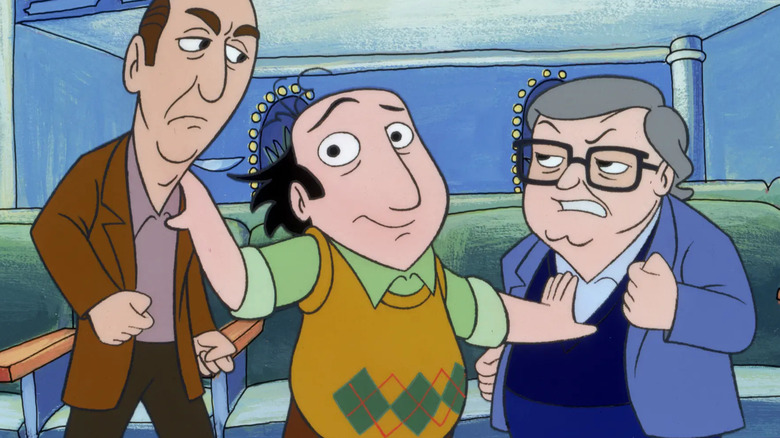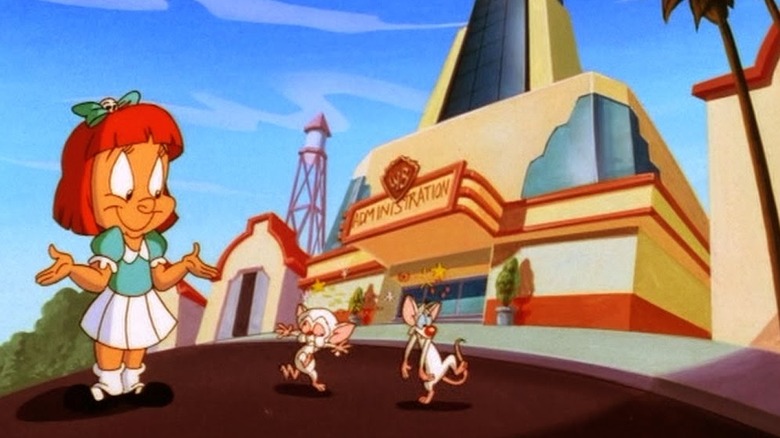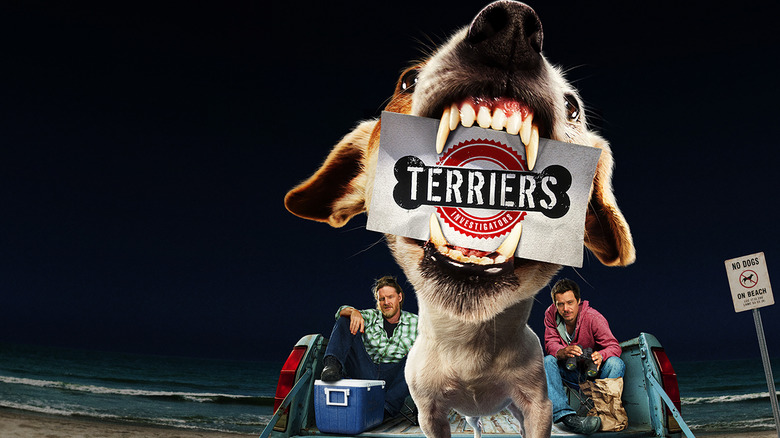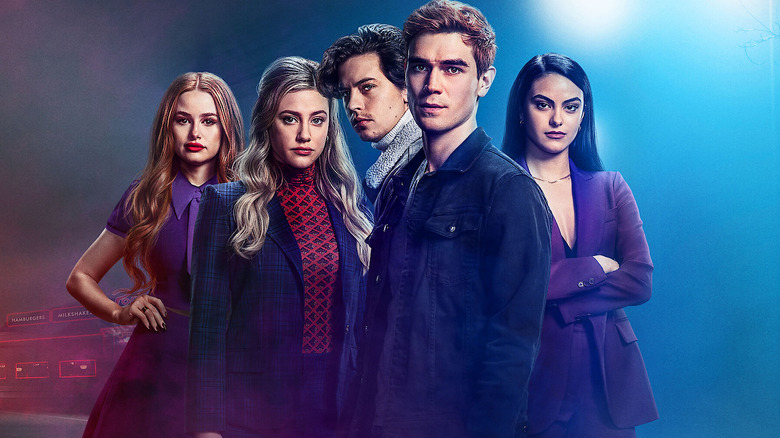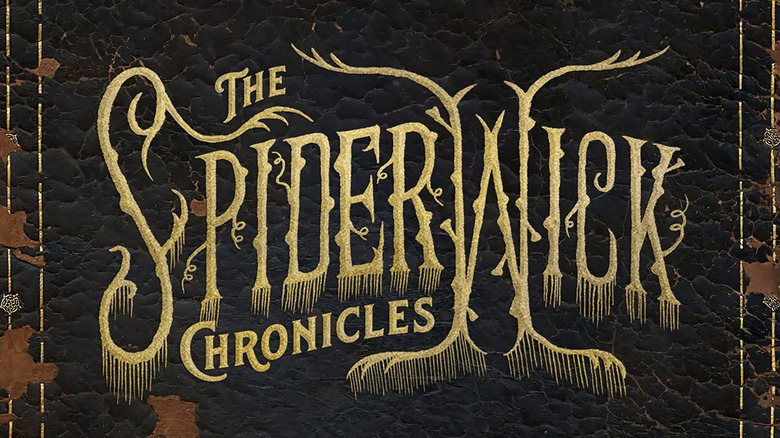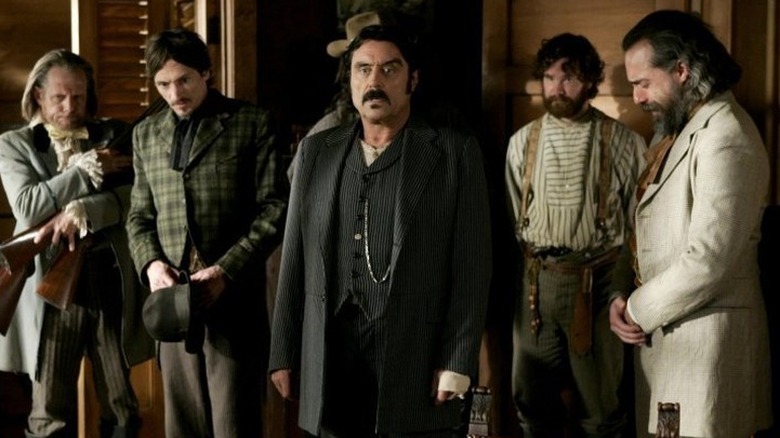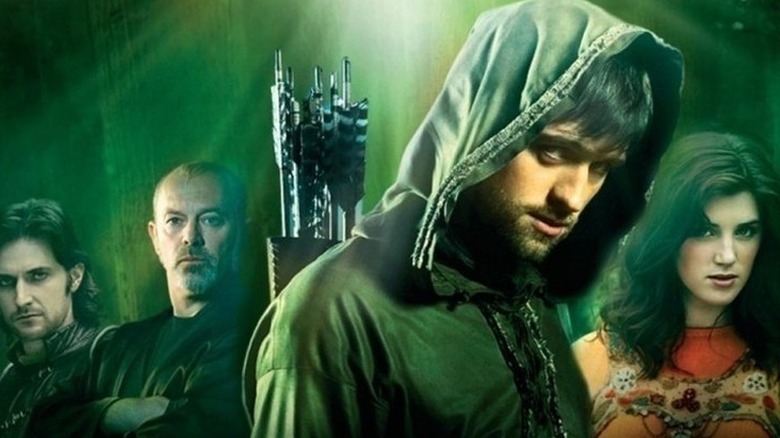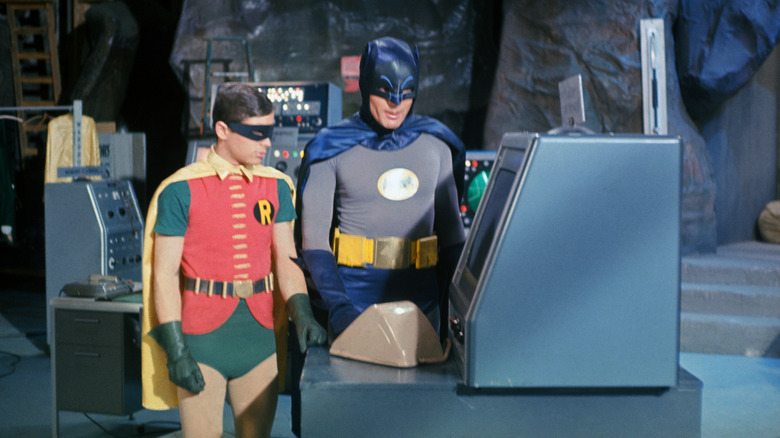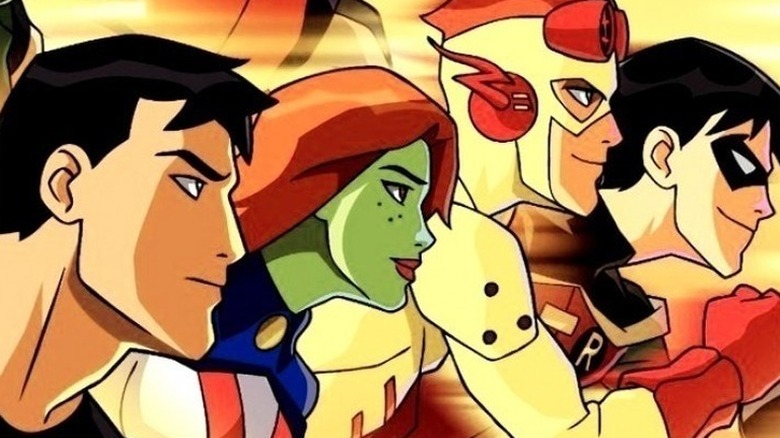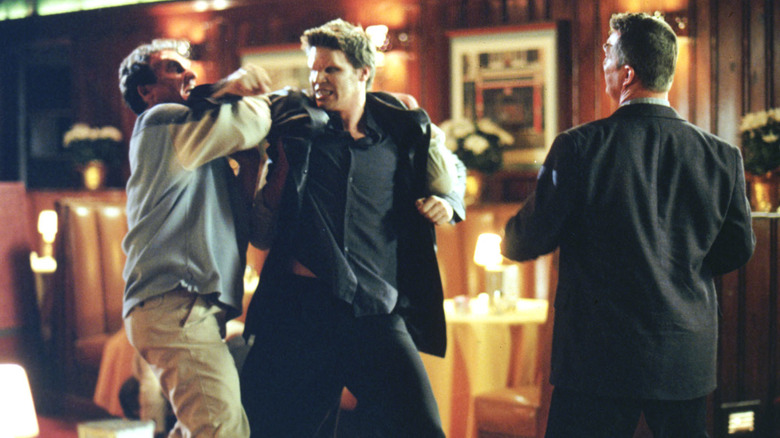Dumb Reasons These TV Shows Were Cancelled
Everybody loves TV, and everybody has lists of their favorite shows — including the ones that, whether it was because of low ratings or other outside factors, ended up getting their plugs pulled and leaving the airwaves before viewers were ready to see them go. Regardless of genre, every television fan eventually grows accustomed to the pain of seeing the plug pulled on their favorite series; whether because of ratings, budget, or cast problems, it's been a reality of the medium since the days when Jackie Gleason was spending Episode 2 of his axed "You're in the Picture" apologizing for the awfulness of Episode 1.
Sometimes, though, the plug gets pulled for reasons that were avoidable — and sometimes, the reasons are even downright dumb. With that in mind, here's a look back into TV history, rounding up some of the most senseless cancellations ever committed. Even if you're a hardcore television fan, their inside stories may surprise you. Here's everything you need to know about the dumb reasons TV shows were canceled.
Kingdom Hospital vs. King
Few places can be scarier than hospitals, so when horror maestro Stephen King made a deal with ABC to write and produce the haunted medical drama "Kingdom Hospital," it seemed like fright fans could be in for a classic in the making. Sadly, the show's sole season was kind of a mess — not on the screen, where it turned out a solid batch of episodes that earned a handful of Emmy nominations, but behind the scenes, where struggles between King and the network doomed its odds of renewal.
Convinced that ABC wasn't doing enough to promote "Kingdom Hospital," the horror legend went out of pocket for a print ad campaign, only to see those efforts foiled when execs bumped the show to a different timeslot. No stranger to Hollywood turmoil, King learned yet again that while ghosts are scary, what's even more terrifying is trying to put together a hit TV series.
Freaks and Geeks' writers wouldn't betray the show's premise
Among the most beloved cult TV shows of all time, "Freaks and Geeks" aired on NBC during the 1999-2000 season. It's one of the few high school series to focus on kids at the social fringes — in other words, the freaks and the geeks.
For the dramedy, set in 1980, creator-slash-writer Paul Feig and executive producer-slash-writer Judd Apatow pulled from their own awkward upbringings to create a show that was emotionally honest and highly relatable — but "Freaks and Geeks" was never a ratings hit, and NBC canceled it after 12 episodes. The executive who actually pulled the trigger, Garth Ancier, visited the set of "Saturday Night Live" in 2014, during a week when "Geeks" cast member Seth Rogen just happened to be hanging out. Rogen discussed the encounter on HuffPost Live in 2014, saying he and Ancier talked about the premature cancellation.
According to Rogen, Ancier said that "Judd [Apatow] wouldn't listen to my notes" — "notes" being industry speak for the instructions executives give showrunners to "improve" their series. Ancier's biggest note for "Freaks and Geeks" was that the characters never got "a victory." In other words, he wanted Apatow to abandon the very essence of the show's premise. Apatow refused, ratings didn't improve, and the network pulled the plug — freeing up a stellar cast of future stars that included Rogen, Jason Segel, James Franco, Linda Cardellini, and Busy Phillips.
Police Squad! asked its audience to pay attention
Lots of movies are made out of TV shows, but the three "Naked Gun!" movies probably may have marked the first time a successful series of films was spawned from an incredibly unpopular TV show. After their silly joke-a-minute disaster movie parody "Airplane!" became a cultural phenomenon in 1980, writer-directors Jim Abrahams and David and Jerry Zucker developed a similarly-styled cop show parody for ABC called "Police Squad!" starring Leslie Nielsen as the inept, stone-faced Lieutenant Frank Drebin.
Like "Airplane!," the jokes were fired in a nonstop barrage ("Who are you and how did you get in here?" "I'm a locksmith and ... I'm a locksmith."), with sight gags and recurring bits contributing to an incredibly dense level of zaniness. That level of detail — and audience expectation — has never been typical of television, particularly when "Police Squad!" hit the airwaves in 1982, and the show subsequently flopped. (A similar ambition — and premature cancellation — befell "Arrested Development" two decades later.)
"Police Squad!" was pulled from ABC's schedule after just four episodes, with the last two airing over the summer. Low ratings were the direct culprit for the show's demise, but ABC president Tony Thomopoulos was surprisingly (and amusingly) frank about why people weren't tuning in, telling a reporter that "the viewer had to watch it to appreciate it." Apparently, that wasn't the case with ABC's other hit shows at the time, such as "Happy Days" and "The Love Boat."
Longmire had lots of viewers, but they were too old to matter
Pulling in roughly three to five million viewers per week, "Longmire" was among the most-watched hourlong dramas on cable TV during its heyday on A&E. It was also innovative — a classic TV western about a tough and gruff Wyoming sheriff (portrayed by Robert Taylor) that took place in a modern-day setting, allowing it to address current social issues. While TV in the '50s and '60s was lousy with Westerns, "Longmire" was just about the only 21st-century example at the time, and its high ratings proved there was still an audience for the genre — indeed, "Yellowstone" and its spinoffs have since stepped right in. Nevertheless, A&E dropped the show — its most-watched original drama ever — in 2014 after three seasons. Why? Because its steady audience of millions was almost entirely over the age of 50.
TV networks are most interested in attracting viewers aged 18 to 49 because advertisers say that's the demographic most likely to have enough disposable income to buy the things they want to advertise. Those over 50, the logic goes, are set in their buying habits and are thus more resistant to advertising, the engine that makes TV run. "Longmire" was soon picked up by Netflix — which for obvious reasons doesn't care as much about ad demographics.
Underground didn't fit with a new corporate structure
Chicago-based WGN was a cable TV staple for decades, delivering sitcom reruns and Chicago Cubs games to viewers around the country. In 2009, the station rebranded as WGN America, a general-interest station in the mold of USA or TNT that began producing high-quality scripted dramas — including "Underground" — centered around the Underground Railroad, the 19th-century network of abolitionists that helped slaves escape the South.
"Underground" brought critical acclaim and some of the best ratings WGN America had ever seen. Despite its success, it was canceled in 2017 after two seasons. Peter Kern, president and CEO of WGN America corporate parent Tribune Media, said that while "Underground" was "a terrific and important series, it no longer fits with our new direction."
That new direction? No more scripted original series at all. WGN America also scrapped the Appalachian drama "Outsiders," and when that series got the axe, Kern said the network would be "reallocating our resources to a more diverse programming strategy." That reallocation was at the behest of executives at Sinclair Broadcast Group, which was in the process of acquiring WGN America and all of Tribune.
"The channel could be run much more profitably on a fraction of what they spend on programming," Sinclair CEO Chris Ripley told the Wall Street Journal. In other words, "Outsiders" and "Underground" — which cost a reported $5 million an episode — were too expensive.
The CBS rural purge
During the 1969-1970 TV season, CBS chief of programming Fred Silverman noticed that the shows getting the most media attention (and top advertising rates) were ABC and NBC series with multicultural casts, set in urban environments, or ones that appealed to young and hip viewers, such as NBC's "Laugh-In" (the No. 1 show on TV) and ABC's hit thriller "The Mod Squad." Silverman also noticed that CBS didn't have many such shows on its schedule.
While bringing in large overall audiences, the CBS slate was primarily based in rural environments or appealing to an aging audience. For example: "Mayberry R.F.D." (No. 4 in the ratings), "The Red Skelton Hour" (No. 7), "The Beverly Hillbillies" (No. 18), and "Hee Haw" (No. 21). Silverman made the brash decision to start canceling this type of series — though they were still pulling in sizeable audiences — and replace them with hip, urbane shows.
The first to go was "The Red Skelton Hour," which had been on the air for nearly 20 years; next came "Petticoat Junction." CBS's first new shows for city folk? "The Mary Tyler Moore Show" and "All in the Family." Both were massive hits, so over the next few years, Silverman systematically replaced all those old, country-laced CBS hits (a list that also included "Green Acres," "Lassie," and "The Jim Nabors Show") with "Good Times," "Maude," and "The Bob Newhart Show."
Fortunately for CBS, Silverman's risk paid off, mostly because the new shows were really good. But in the TV industry, Silverman's tactic became known as "the rural purge," and took a lot of beloved shows away from their audiences. As "Green Acres" star Pat Buttram once quipped: "CBS canceled everything with a tree in it."
Reading Rainbow wasn't educational in the right way
Did LeVar Burton's beloved PBS series leave the air after 26 years because kids today are too addicted to their gadgets to be interested in a dumb old book? Not at all. Budget restrictions forced the cancellation of "Reading Rainbow" in 2009 because it wasn't educational ... in the right way.
It all started with the No Child Left Behind Act. Signed into law in 2002, it sought to establish new educational benchmarks for American kids, many of which would be measured with standardized test results. It certainly sounded noble, but it had the side effect of encouraging schools to "teach to the test" and focus on quantifiable subjects, like math and reading skills.
Not so easy to test, however, was a love of reading, which is what "Reading Rainbow" helped inspire for countless viewers during its 1983-2006 run. But hope is not lost: The show has resurfaced as the interactive series "Reading Rainbow Live."
Amazon's cowardly excuse for cancelling A League of Their Own
It was already questionable when the Prime Video series "A League of Their Own," based on the 1992 movie of the same name, was set to conclude with a second season only four episodes long — half the length of Season 1. While streamers are secretive about viewership data, co-creator Will Graham posted on X (formerly Twitter) shortly after the Season 2 announcement that the women's baseball show had more viewers than other series that received full renewals from Amazon. Yet, even that abridged ending is no longer happening, with "A League of Their Own" Season 2 being canceled in August 2023 amidst the WGA and SAG-AFTRA strikes.
The official reasoning given for cancellation was that the strikes would have delayed production in 2024 and the release in 2025, which would have been a three-year gap between seasons. Of course, fans would have been much happier waiting three years for a conclusion than getting none at all. Abbi Jacobson, the show's star and other co-creator, took issue with this reasoning, writing on Instagram, "To blame this cancellation on the strike, (which is an essential fight for fair wages, protections and working conditions, etc...) is bullsh*t and cowardly."
The Peripheral was also renewed, then un-renewed
At the same time Amazon Studios pulled the plug on Season 2 of "A League of Their Own," they gave the same treatment to Season 2 of "The Peripheral." According to The Hollywood Reporter, some insiders at Amazon believed the sci-fi series, based on the novel by William Gibson, shouldn't have been renewed in the first place, given how massive the original season's $175 million budget was in contrast to its "lukewarm" audience response. These insiders claimed Season 2 was greenlit to keep the streamer on good terms with producers Lisa Joy and Jonathan Nolan (who had just experienced another major cancellation with HBO pulling "Westworld" from its streaming platform after Season 4).
However justifiable canceling "The Peripheral" after Season 1 might have been, canceling Season 2 after already greenlighting it was no less out of the ordinary — and a bad omen for the future of studio-talent relations. Not long after the show's cancellation announcement, Joy and Nolan's development deal with Amazon was suspended, as the AMPTP companies as a whole were cutting off long-standing deals with writer-producers left and right.
The Owl House didn't fit the Disney brand?
Unlike some shows on this list, the animated fantasy series "The Owl House" managed to get a satisfying ending — albeit, one significantly condensed from a full third season to just three hour-long specials. With ratings on par with other ongoing Disney Channel shows and a passionate online fanbase, why didn't it get its full, intended three-season run?
Creator Dana Terrace provided the answer on Reddit: "At the end of the day, there are a few business people who oversee what fits into the Disney brand and one day one of those guys decided TOH didn't fit that 'brand.' The story is serialized (BARELY compared to any average anime lmao), our audience skews older, and that just didn't fit this one guy's tastes. That's it! Ain't that wild? Really grinds my guts, boils my brain, kicks my shins, all the things. It sucks but it is what it is."
What exactly about "The Owl House" was considered un-Disney? Perhaps the serialized storytelling was an outlier on the Disney Channel, but considering that almost every Disney+ show is serialized and many of them skew towards all ages as opposed to just children, surely "The Owl House" could have fit on Disney's streaming service. Terrace initially pushed back against the theory that the show's LGBT+ representation led to the cancellation, but after news of Disney's donations to politicians backing Florida's "Don't Say Gay" bill, she was less charitable in her analysis.
OK K.O.! ended early because of ... Donald Trump?
Like "The Owl House," Cartoon Network's "OK K.O.! Let's Be Heroes" had its third and final season cut short from the original plan for the series. The dumb decision that led to the action-comedy cartoon's premature ending, however, was not a decision made by the network, but, according to creator Ian Jones-Quartey, a decision made by the former President of the United States.
"OK K.O.!" was made with the intention of premiering on a streaming service formed by the merger of Warner Bros. and AT&T — basically, what became HBO Max. "Donald Trump specifically hated Warner Brothers because they own CNN, so he wouldn't let that merger go through," Jones-Quartey said in a 2021 interview with Creative Talent Network. "Basically what happened is the studio and like all the Warner and studios, basically got stuck in a holding pattern while they were waiting for this merger to go through."
With all the delays in the merger, "OK K.O.!" ended up airing its entire run on Cartoon Network well before the launch of HBO Max. Restrictions on spending during the waiting period for the merger's approval ultimately led to the show's early cancellation, and reportedly impacted much of what was being made at Cartoon Network Studios — a studio which no longer exists as an independent entity. So, depending on your point of view, you could say Donald Trump ruined Cartoon Network — or at least, put too much faith in AT&T.
Infinity Train lacked a child entry point
The anthology set-up of "Infinity Train," with each season or "book" dealing with different characters facing their problems in the same setting, could have theoretically let the show run for, well, infinity — or at least as long as the writers wanted. Creator Owen Dennis had plans for eight seasons, with the fifth one taking the form of a movie about how Amelia met the Conductor One. According to a Reddit AMA with Dennis, Cartoon Network "passed on it though because they thought it didn't have a child entry point." Another pitch with a younger protagonist was made to specifically address the network's disinterest in adult main characters, but even that was rejected, and "Infinity Train" ended after four seasons.
The logic behind the cancellation makes little sense, given that "Infinity Train" was the fourth most streamed HBO Max original of 2020. It also seemed to have been caught up amidst wildly fluctuating corporate mandates: a Vulture article from May 2022 stated Cartoon Network was actively seeking out young adult-oriented content, which you'd think "Infinity Train" would be the model example of what to look for in that space. Just three months after that article, the corporate mandate seemingly shifted again, with HBO Max deleting "Infinity Train" and 35 other mostly-animated series, a move Dennis called "incredibly unprofessional, rude, and just straight up slimy" on his Substack.
Clone High died because of Gandhi (and was revived without him)
How many TV shows get canceled because of protests from people who've never watched them in a country where it's not even airing? This was the strange fate of "Clone High," the 2002 MTV cartoon created by Bill Lawrence ("Scrubs," "Ted Lasso"), Phil Lord, and Christopher Miller (the "LEGO," "Jump Street," and "Spider-Verse" movies). The show's main characters are all teenage clones of famous historical figures. The Gandhi clone (voiced by Michael McDonald) responds to the pressure of living up to one of history's greatest leaders by not even trying, instead behaving as a wacky party animal.
"Clone High" never aired in India, but seeing the character's bio on the MTV website was enough to spark a hunger strike of 150 politicians — and the real Gandhi's grandson — at the MTV India offices. The show's creators had two possible solutions in response to the controversy: They were willing to continue the show without Gandhi, or they could make a quick adjustment so the Gandhi character was actually a Gary Coleman clone and then continue as usual. Alas, the Viacom higher-ups rejected both options, and the show went off the air for the next two decades; it would eventually return, Gandhi-free, on Max in 2023.
Firefly was aired out of order
The fact that "Firefly" only lasted one season might very well have contributed to its cult favorite status. Plenty of other sci-fi shows have started strong only to quickly go off the rails — "Heroes" says hi! — and some of the planned episode ideas for "Firefly" Season 2 sound flat-out awful. Even with this in mind, as well as other serious problems that have come to light regarding creator Joss Whedon, it still feels like "Firefly" was treated unfairly during its run on Fox.
From the beginning, the Fox executives disliked that Zoe (Gina Torres) and Wash (Alan Tudyk) were married, and had contradictory requests over how dark and violent the show should be. It was scheduled for the "Friday night death slot," and hyperactive comedy-centric advertisements didn't match the tone of the show. Perhaps the worst sign of how the show was set up to fail was that the pilot episode was somehow changed to the season/series finale, and three episodes didn't air on Fox at all.
The O.J. Simpson trial kept pre-empting Gargoyles
An unusually mature, action-oriented standout of the Disney Afternoon lineup, "Gargoyles" started off popular — so popular, in fact, that CEO Michael Eisner asked creator Greg Weisman about using it as the launching pad for a whole DC or Marvel-style universe. Ratings in the second season, however, declined, and a toned-down third season made by a different crew for Saturday mornings flat-out flopped.
Big ambitions followed by disappointment can be a pretty normal cycle for TV shows, but there's one factor in this decline that makes things weird: The O.J. Simpson trial. Yes, one of the big factors leading to the cancellation of "Gargoyles" was that the second season kept getting preempted by O.J. trial coverage on many of the stations that ran the Disney Afternoon in syndication. "Every day it ran," Weisman told Polygon, "we were being preempted, and in any given city, people were missing episodes of 'Gargoyles,' and falling out of the habit of watching it." The Juice might have been found "not guilty" of murder, but he delivered a killing blow to a great show.
HBO Max no longer wanted family shows like Gordita Chronicles
"Gordita Chronicles," a sitcom about a family of Dominican immigrants in 1980s Miami, got universally positive reviews and was building word of mouth on HBO Max in the summer of 2022, only to get canceled a little over a month after its premiere. HBO Max's official statement on the cancellation, provided to Today, pointed to a change in the streamer's priorities: "Live-action kids and family programming will not be part of our programming focus in the immediate future, and as a result, we've had to make the very difficult decision to end 'Gordita Chronicles' at HBO Max." Considering a year later HBO Max rebranded to just "Max" in hopes of appealing more to family audiences, it feels like a lot of shows are being lost amidst some severely confused priorities.
"It felt very unjust," creator Brigitte Muñoz-Liebowitz told Rolling Stone. "It didn't matter that our show was beloved, it didn't matter that we had good audience numbers. It didn't matter that we were writing about content that was important for underrepresented communities. None of that mattered." Many have connected this cancellation to broader unfortunate trends regarding Latine-centric programs being likely to be canceled. A year later, slim hope remains for fans of "Gordita Chronicles": Though the show has been deleted from HBO Max, Sony Pictures Television still reportedly has plans to shop the series around to other networks and streaming services.
Snowpiercer Season 4 was completed and deleted
TNT and TBS have been hit particularly hard by the Warner Bros. Discovery merger, with both networks leaving the realm of scripted television under CEO David Zaslav's attempts at cost-cutting. While this move didn't interfere with the production of the few TNT and TBS originals already greenlit for more episodes, it has interfered with many of those episodes getting to air.
"Snowpiercer," inspired by the graphic novel by Jacques Lob and its film adaptation from Bong Joon-ho, was a hit for TNT, successful enough to be picked up for a fourth and final season before Season 3 even began airing. But hold the phone: TNT won't be airing the sci-fi thriller's final season, though Tomorrow Studios can still shop it around to other networks and maintains enough faith in the series to discuss building a whole franchise around it. Supposedly it's yet another tax write-off for WBD, though the logic behind writing off a show that was clearly doing well enough to earn four seasons is questionable.
Chad Season 2 was pulled just hours before airing
Warner Bros. Discovery's gutting of TBS and TNT reached maximum cruelty — and inexplicability — on July 11, 2022. That was the day Season 2 of "Chad," a comedy starring "Saturday Night Live" alum Nasim Pedrad as an awkward teenage boy, had been advertised to premiere — only for the show to get canceled and the broadcast pulled from TBS that very same day. The series would eventually be rescued from completely disappearing, however, thanks to The Roku Channel.
All the corporate statements in the world about how networks "celebrate" the creators of completed shows they're refusing to air doesn't change just how unfair this whole practice is. Doing this to "Chad," a show that got mostly good reviews from critics and had strong viewership ratings in Season 1 but was targeted online with sexist and Islamophobic review-bombing, only seemed to further embolden those who would condemn it.
Star Trek: Prodigy was pulled from streaming while still in production
HBO Max's massive content deletions have become scarily influential across the whole streaming world. In June 2023, Paramount+ joined the deletion game by removing "Grease: Rise of the Pink Ladies," "Queen of the Universe," "The Game," and "Star Trek: Prodigy." That last removal feels particularly dumb in light of the fact the kid-friendly animated "Star Trek" series had already been deemed successful enough to get renewed for a second season.
"Star Trek: Prodigy" Season 2 did get to continue production even after being removed from Paramount+, in hopes of finding a new buyer for the series. Even so, Paramount+ advertises itself as "The Home of 'Star Trek,'" so why on Earth would they not want to be the home of a new "Star Trek" series? At least "Star Trek: Prodigy" has been released on Blu-ray, unlike most other streaming series, so it's still possible to watch the first season legally even if the deletion remains incredibly frustrating.
Ellen -- the sitcom -- cancelled for gay content
It's important to specify this slide is talking about the '90s sitcom "Ellen," rather than Ellen DeGeneres' daytime talk show "The Ellen DeGeneres Show," which was canceled for very different reasons. DeGeneres may have been in the wrong with how she treated her talk show staff, but when it came to the end of her sitcom, it was the ABC executives who were at fault.
The star comedian famously came out as gay with Season 4's groundbreaking two-parter "The Puppy Episode." In 1997, this was controversial enough that ABC put parental discretion warnings for "adult content" over many episodes of Season 5 — a move which upset DeGeneres. Network executives reportedly feuded with DeGeneres over how much gay content to include in Season 5, which ultimately ended up being the show's final season. While declining ratings might offer a not-stupid explanation for the cancellation, battles over just how gay the final season could be end up looking ridiculous in retrospect.
Daredevil got semi-rebooted -- conveniently preventing raises
With the launch of Disney+ and the start of Marvel Studios producing its own shows for the new streaming service, the Marvel TV series formerly streaming on Netflix were phased out. But "Daredevil," the most consistently popular of the Netflix/Marvel shows, will be making its grand return on Disney+ under the new title "Daredevil: Born Again."
With stars Charlie Cox, Vincent D'Onofrio, and Jon Bernthal reprising the roles of Daredevil, Kingpin, and The Punisher, this isn't a reboot so much as a new season of the previous series — trade papers The Hollywood Reporter and Deadline described it as such. But the former showrunner of the series says the name change is simply a ploy to pay the crew at the rate of a show's first season rather than its fourth. So this decision isn't exactly dumb. If anything, it's genius in an evil capitalist sort of way.
Steven DeKnight, showrunner of "Daredevil" Season 1, described the situation on X (formerly Twitter) as "an old Disney scam where they slightly rename a series to reset contract terms back to first season," saying this problem "needs to be addressed by all the guilds/unions and crushed!"
The Critic's second cancellation was due to one angry executive
The first time "The Critic" was canceled in 1994, it made sense: Scheduled after "Home Improvement" on ABC, it completely alienated the audience, and ratings declined dramatically week after week. Despite this initial failure, "The Critic" got a second chance on Fox the following year, where it aired after "The Simpsons" and retained a much higher percentage of its lead-in's audience.
Nielsen ratings for the Fox run might not have been exactly as high as series co-creator Al Jean recalled them being in Cracked's oral history of "The Critic," but it was still one the more-watched shows on Fox that year, lending credence to Jean's assessment that the cartoon "was canceled due to politics." Specifically, Jean and co-creator Mike Reiss place the blame on John Matonian, who became President of Fox from 1995-96 and reportedly hated "The Critic."
"One day," Reiss recalled, "he called us in for a meeting with the Fox brass and said, 'I want to play an episode of your show, and I want you to tell me what's funny.' He put the show on, and it started playing and all the younger executives were laughing. They knew they weren't supposed to like this. They were supposed to not laugh and make the boss happy, but they were cracking up. John Matonian turned around and went, 'Why are you laughing!?!?'" Matonian was responsible for the show's second, stupider cancellation.
Adding Elmyra ruined Pinky and the Brain
When a show gets retooled so heavily that the writers state their disdain for making it in the theme song, it's fair to assume it's not long for this world. Such is the case with "Pinky, Elmyra, & the Brain," the spinoff-slash-sequel to "Pinky and the Brain" where the lab mice were no longer plotting world domination at ACME Labs but instead living with the animal-abusing "Tiny Toon Adventures" character Elmyra Duff. The theme song answers why this bizarre revamp exists: "It's what the network wants, why bother to complain?"
The WB didn't know what to do with "Pinky and the Brain," a cartoon more intellectual and adult-skewing than they wished their Saturday morning block to be, but also failed to become the next "Simpsons" in primetime — likely because it was scheduled up against the long-running TV staple "60 Minutes" on Sundays at 7 pm.
According to Uproxx, network executives thought the show needed a "broader cast of characters"; the writers mocked this demand in episodes such as "Pinky and the Brain... and Larry." After three seasons of the classic world-domination-themes, the network got its way — and nobody liked it, effectively ending both "Pinky and the Brain" and Steven Spielberg's long run of collaborations with Warner Bros. Animation until it was brought back with the 2020 "Animaniacs" revival (which returned Pinky and the Brain to their original format).
Terriers' marketing gave zero hint what the show was about
Look at the above advertisement for the 2010 FX series "Terriers" and take a guess as to what the show is about. Two beach bums with an angry dog, maybe? The small-print "investigators" caption gives you a hint of the plot — it's a buddy detective show — but otherwise, after seeing this you'd probably be surprised that there's no angry dog in the actual show, nor any of the "in your face" attitude the marketing tried to present.
FX President John Landgraf attempted to downplay the impact bad marketing had on the critical favorite's low ratings and ultimate cancellation. In talking with the Los Angeles Times, he argued that the show was just too subtle for the wider public to appreciate and that no amount of marketing could have helped it.
Some 13 years later, however, producer Shawn Ryan still maintains that a vague title and bad marketing sealed the show's fate, not its subtlety. "I blame myself for not pushing better for a better title," he says. "And I think FX would admit that they never got the marketing right on that show." He considers it a show that "happened at the wrong time, at the wrong place," and might have done better today with a streaming binge-release model.
Nearly the whole CW lineup got scrapped after selling the network
There was an astounding 19 shows canceled by The CW in 2022 and 2023: "Riverdale," "Nancy Drew," "The Flash," "Kung Fu," "Walker: Independence," "The Winchesters," "Gotham Knights," "Would I Lie To You?," "Two Sentence Horror Stories," "Batwoman," "Charmed," "Dynasty," "In the Dark," "Legends of Tomorrow," "Legend of the Hidden Temple," "Naomi," "Roswell, New Mexico," "Stargirl," "Tom Swift," and "4400". At this time, only four original dramas previously on the line-up — "Walker," "Superman & Lois," and both "All American" and its spinoff "All American: Homecoming" — have been renewed.
Some of these shows naturally reached their conclusions, while others were less than successful, but altogether, the mass of cancelations is startling. Why this extreme house clearing? Well, in 2022, the majority of shares in The CW were sold from previous co-owners Paramount Global and Warner Bros. Discovery to Nexstar Media Group, which canceled everything in an attempt to boost profitability.
There's a lot of dumb to go around here. There's the dumbness of the previous owners reportedly running a major network for 15 years without ever being profitable — which is either bad business or extremely sketchy Hollywood accounting. There's the dumb-in-retrospect decision not to renew The CW's lucrative deal with Netflix in 2019. But now Nexstar is bringing in a different sort of dumb, looking at how The CW's shows have been surprisingly popular with older viewers and instead of giving those viewers more of what they clearly enjoyed, deciding they need more generic reality shows.
The Spiderwick Chronicles got cancelled before any of it was released
Someone at Disney+ saw how furious the whole internet and entertainment industry was about David Zaslav canceling the unreleased "Batgirl" movie (which had already completed filming for a tax write-down) and decided, "I wanna do that too!" To be fair, however, the situation with the six-episode miniseries adaptation of Tony DiTerlizzi and Holly Black's children's book "The Spiderwick Chronicles" wasn't quite as dire, because the show's multiple production companies are still allowed to shop it around to other streaming services. Even so, it's baffling that streaming services are continuing to go all-in on canceling finished or near-finished projects.
For something like "Spiderwick," it's particularly heartbreaking to think about this from the perspective of the show's young stars, Lyon Daniels and Noah Cottrell. Imagine being 16 years old and spending nearly five months of your life on a big fantasy series based on beloved source material that will likely set you on the path to achieving your acting dreams — only to find out Disney wants to get rid of it for a tax break and, possibly, no one will ever see it. Making matters more frustrating, Cottrell has already lived through a similar version of this disappointment, thanks to HBO Max's treatment of "Gordita Chronicles."
The creator of Deadwood wanted a full fourth season or no fourth season
HBO's dazzling Western series "Deadwood" ended abruptly after three seasons in 2006. The network wanted the show to return, offering creator and showrunner David Milch a fourth season — albeit, a shortened one. Milch wanted more, however, and rather than taking an abbreviated fourth season, he told HBO no thanks, and "Deadwood" was canceled. Milch's impulsive decision, and the HBO executives' willingness to go along with it, took the rest of the show's cast and crew by shock, marking a rare premature cancellation in an era where HBO had a positive reputation for letting shows with low ratings but critical acclaim reach natural conclusions.
Eventually, "Deadwood" did get a proper finale — though it was much shorter than even the abbreviated fourth season would have been. "Deadwood: The Movie" aired on HBO in 2019, reuniting the majority of the show's cast and earning near-universal positive reviews.
Robin Hood killed the Robin Hood character
Casting turnover is a fact of life for television showrunners, who routinely have to come up with novel ideas to get around the loss of stars for various reasons. But few have done so more brazenly — or less successfully — than BBC One's "Robin Hood."
When series star Jonas Armstrong decided to vacate the role of Robin after the show's third season, instead of recasting, the producers opted to kill off the character. That's right, somebody thought it would be a good idea to have a show called "Robin Hood" without Robin Hood.
While killing off a show's main character doesn't necessarily mean doom for a TV show (as "Game of Thrones" can surely attest), there just wasn't anywhere to really go with this premise. Making matters worse, the series had already killed off Robin's love interest Maid Marian, who might have been a character strong enough to step up. Instead, it left a supporting cast with an impossible burden — and although the "Robin Hood" writing staff was willing to attempt a revamp, the network ultimately decided there wasn't any point in continuing.
Batman destroyed their sets
The '60s "Batman" series starring Adam West is a far cry from today's hard-hitting superhero entertainment, but it's still enjoyable as a colorfully campy cult classic — and one that might have stayed on the air longer if someone at the network hadn't gotten a destructive itch.
Despite the show being a hit out of the gate, ABC wasn't willing to continue footing the bill for Batman after its first couple of seasons. Deciding to sell the rights to NBC instead of canceling the show outright, it appeared as though a rescue was near. The execs at NBC, looking to cut a few costs of their own, made sure the series' existing sets and props were part of the deal. Unfortunately, during a brief production hiatus as the show prepared its switch between networks, an ABC executive goofed up and had the sets destroyed.
"NBC was going to pick up 'Batman' [for a fourth season], but producers had destroyed the Batcave, which cost $800,000 to make," Burt "Robin" Ward told MeTV in 2017. "And NBC didn't want to spend that much to rebuild the Batcave."
Subsequently, the Caped Crusader and Boy Wonder were forced to hang up their cowls. While West and Ward would later reprise their turns as Batman in various cartoons and films, it turns out that Batman's most effective nemesis may simply have been a mundane, misplaced memo.
Young Justice was changed because girls don't buy toys
It isn't easy to put together a hit series, so when Warner Bros. hit paydirt with their Cartoon Network show "Young Justice" — which posted triple-digit ratings increases for its time period on the channel — it seemed safe to assume they'd want more than two seasons. Alas, the studio pulled the plug after a mere 46 episodes, prompting fan outcry.
Talking with Kevin Smith on the podcast "Fat Man on Batman" in 2013, Paul Dini claimed "Young Justice" was canceled because Cartoon Network disliked that the show had so many female viewers, who weren't buying the toys marketed at young boys. Creator Greg Weisman clarified on "The Hip-Hop Nerd" podcast in 2016 that the show's budget was largely drawn from a merchandising tie-in deal for "Young Justice" action figures — and when low sales killed the toy line, the show quickly followed suit.
Fortunately, strong streaming numbers and fan passion did eventually lead to the series getting revived, with two additional seasons being made for DC Universe and HBO Max.
Angel asks for early renewal, gets cancelled instead
After "Buffy the Vampire Slayer" went off the air in 2003, fans flocked to the show's spinoff series "Angel," entering its fifth season on The WB at the time. After spending years on the renewal bubble, "Angel" enjoyed a post-"Buffy" ratings bump, which convinced series creator Joss Whedon to approach the network about an early pickup for its sixth season.
Although Whedon's move wasn't purely a power play — he was looking for extra security for the show's team, who'd endured years of passing up potential gigs while waiting for last-minute renewal news — it was viewed as an ultimatum by the network president, who reacted by pulling the plug. Although the network later admitted they'd made a mistake, it was too late to revive "Angel." As with "Buffy," the story of "Angel" would be continued beyond the TV show's ending through comic books, but there'd be no more episodes forthcoming.
